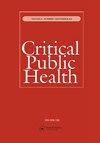Using Habermas’ theory of communicative action to transform sociological analyses of evidence-based policy
IF 2.3
3区 医学
Q2 PUBLIC, ENVIRONMENTAL & OCCUPATIONAL HEALTH
引用次数: 1
Abstract
ABSTRACT Many sociological analyses of evidence-based policy frame it as contributing to the rationalisation of social relations, and being constructed through and implicated in systems of knowledge/power. These analyses are based on social theory placing insufficient emphasis on the emancipatory potential of evidence, and the possibility of rational adjudication of truth claims. We argue sociological engagement with evidence-based policy could be transformed by being informed by the work of Habermas. Habermas’ work could enable a more nuanced view of EBP in terms of whether or not this leads to rationalisation in the form of de-politicisation or marginalisation of citizens’ voices. Habermas’ work on knowledge-constitutive interests could inform a reconstructed view of evidence, disabused of positivist assumptions and with increased emancipatory potential. Habermas’ notion of the ideal speech situation as a procedural basis for truth could function as a standard for exploring how EBP is affected by power asymmetries, as well as for adjudicating truth claims.运用哈贝马斯的交往行为理论改造循证政策的社会学分析
许多基于证据的政策的社会学分析将其框架为有助于社会关系的合理化,并且通过知识/权力系统构建并涉及其中。这些分析是基于社会理论,对证据的解放潜力和对真理主张的理性裁决的可能性重视不够。我们认为,社会学对基于证据的政策的参与可以通过哈贝马斯的工作来改变。哈贝马斯的工作可以让我们对EBP有一个更细致入微的看法,即这是否会以公民声音的去政治化或边缘化的形式导致合理化。哈贝马斯关于知识构成利益的工作可以为重建证据的观点提供信息,消除实证主义假设的滥用,并具有更大的解放潜力。哈贝马斯关于理想言语情境作为真理的程序基础的概念,可以作为探索EBP如何受到权力不对称影响的标准,也可以作为裁决真理主张的标准。
本文章由计算机程序翻译,如有差异,请以英文原文为准。
求助全文
约1分钟内获得全文
求助全文
来源期刊

Critical Public Health
Multiple-
CiteScore
5.90
自引率
7.10%
发文量
36
期刊介绍:
Critical Public Health (CPH) is a respected peer-review journal for researchers and practitioners working in public health, health promotion and related fields. It brings together international scholarship to provide critical analyses of theory and practice, reviews of literature and explorations of new ways of working. The journal publishes high quality work that is open and critical in perspective and which reports on current research and debates in the field. CPH encourages an interdisciplinary focus and features innovative analyses. It is committed to exploring and debating issues of equity and social justice; in particular, issues of sexism, racism and other forms of oppression.
 求助内容:
求助内容: 应助结果提醒方式:
应助结果提醒方式:


